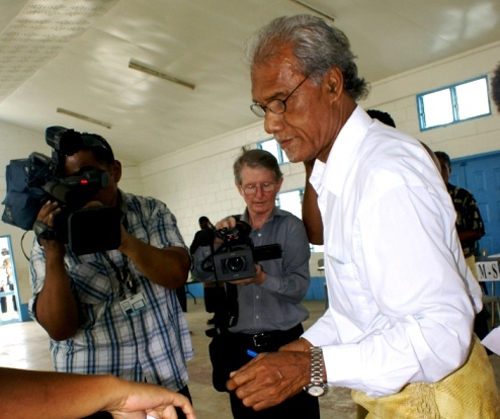
After a landslide win at the polls on Thursday, Friendly Islands Democratic Party leader ‘Akilisi Pohiva has a lot on his mind.
After taking out 12 of the 17 popularly elected parliamentary seats, all eyes rest on the party to deliver a more efficient, productive, and less corrupt regime than the one they have long-criticised
As party leader, Pohiva is a strong candidate for the most important role in reaching this goal – prime ministership.
“The first thing we need to do is to have a big clean up,” Pohiva declared in an interview at the weekend.
“The new government will have to find out where we are financially – all the money, property, assets we have before we move on.”
According to Pohiva, unchecked corruption or “leakages” at the Customs and Revenue departments need to be plugged. Frivolous expenses of politicians – including first class international flights and personal use of government vehicles – will also be cut.
“We really want extra check and balance mechanisms in place,” he said.
He has proposed the establishment of a Public Accounts Committee to scrutinise state finances, the revival of the Anti-Corruption Commission which has been idle since 2008, and stronger support for media bodies as watchdogs.
Plea for dedication
The former teacher is also calling on senior civil servants and CEOs to “review their attitudes towards work” and “set a good example” of dedication and action: “The Civil Service must learn to adapt to the new political settings, but that process of adaptation will take time.”
But with such towering ideals, Pohiva and his party will need help. Nine of the 12 elected from their group – Paati Temokalati ‘a e ‘Otu Motu ‘Anga’ofa – are new to Parliament and at least three have no experience at all in civil service.
Results also show that only Pohiva and current MPs ‘Isi Pulu and ‘Uliti Uata won more than 50 percent of the votes in their respective electorates. In fact, Pohiva confirmed he will not rule out calling on interim Prime Minister Feleti Sevele for advice in the future, and any former officials who did not get re-elected.
“The new government will definitely need to learn things quickly,” said Dr Malakai Koloamatangi, a Tongan political scientist from the University of Canterbury, “but we should give them a chance.”
Moreover, it is hard to fault the choices from a 90 percent voter turnout – especially with such large margins in the final results.
“I think we shouldn’t be surprised at the results. The Pro-Democracy group have been campaigning for the last 20 years,” added Dr Koloamatangi.
The issue of the moment is one of unity, and whether all the newly confirmed MPs – the winning party, independent representatives and nobles’ representatives – can agree on the choice of Prime Minister.
Some nobles disagree
While re-elected Lord Ma’afu – the influential leader of the Havea clan – has told media that “now is not the time” for a noble to be PM, it is understood that some nobles disagree.
Pohiva’s recent bid to have Nobles’ Representatives elected by the general population rather than their peers has also raised flags.
Pohiva is confident of lobbying at least two of the independents, but the relationship with the aristocrats remains “delicate”.
“I think we’ll meet with the nobles next week, but we have to settle things with the People’s Representatives first,” Pohiva said.
The party will confirm its nomination for Prime Minister and on Tuesday plans to take the nomination to other elected People’s Representatives. During the campaign period, some party members publicly named Pohiva as their choice for PM, although Pohiva indicated after the elections that two others may also be in consideration.
Meanwhile, Dr Koloamatangi warns that whatever the outcome, it is important that people’s expectations of the new government are realistic.
“Tongans need to have patience to give the government a chance to do something. I’m talking long term, like eight to 12 years. Otherwise, they will be disappointed.”
He said that if a democratic government did not deliver, Tonga could revert back to authoritarian rule.
Tongan elections: Independent power brokers may hold key to choice of PM
Tongan elections: Clear majority won by the pro-Democracy movement



